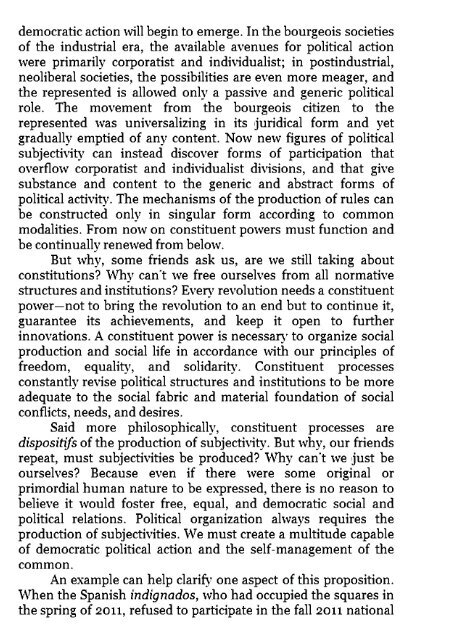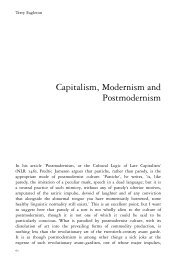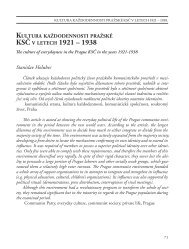Chapter 1: Subjective Figures of the Crisis ... - Negri in English
Chapter 1: Subjective Figures of the Crisis ... - Negri in English
Chapter 1: Subjective Figures of the Crisis ... - Negri in English
Create successful ePaper yourself
Turn your PDF publications into a flip-book with our unique Google optimized e-Paper software.
democratic action will beg<strong>in</strong> to emerge. In <strong>the</strong> bourgeois societies<br />
<strong>of</strong> <strong>the</strong> <strong>in</strong>dustrial era, <strong>the</strong> available avenues for political action<br />
were primarily corporatist and <strong>in</strong>dividualist; <strong>in</strong> post<strong>in</strong>dustrial,<br />
neoliberal societies, <strong>the</strong> possibilities are even more meager, and<br />
<strong>the</strong> represented is allowed only a passive and generic political<br />
role. The movement from <strong>the</strong> bourgeois citizen to <strong>the</strong><br />
represented was universaliz<strong>in</strong>g <strong>in</strong> its juridical form and yet<br />
gradually emptied <strong>of</strong> any content. Now new figures <strong>of</strong> political<br />
subjectivity can <strong>in</strong>stead discover forms <strong>of</strong> participation that<br />
overflow corporatist and <strong>in</strong>dividualist divisions, and that give<br />
substance and content to <strong>the</strong> generic and abstract forms <strong>of</strong><br />
political activity. The mechanisms <strong>of</strong> <strong>the</strong> production <strong>of</strong> rules can<br />
be constructed only <strong>in</strong> s<strong>in</strong>gular form accord<strong>in</strong>g to common<br />
modalities. From now on constituent powers must function and<br />
be cont<strong>in</strong>ually renewed from below.<br />
But why, some friends ask us, are we still tak<strong>in</strong>g about<br />
constitutions Why can't we free ourselves from all normative<br />
structures and <strong>in</strong>stitutions Every revolution needs a constituent<br />
power—not to br<strong>in</strong>g <strong>the</strong> revolution to an end but to cont<strong>in</strong>ue it,<br />
guarantee its achievements, and keep it open to fur<strong>the</strong>r<br />
<strong>in</strong>novations. A constituent power is necessary' to organize social<br />
production and social life <strong>in</strong> accordance with our pr<strong>in</strong>ciples <strong>of</strong><br />
freedom, equality, and solidarity. Constituent processes<br />
constantly revise political structures and <strong>in</strong>stitutions to be more<br />
adequate to <strong>the</strong> social fabric and material foundation <strong>of</strong> social<br />
conflicts, needs, and desires.<br />
Said more philosophically, constituent processes are<br />
dispositifs <strong>of</strong> <strong>the</strong> production <strong>of</strong> subjectivity. But why, our friends<br />
repeat, must subjectivities be produced Why can't we just be<br />
ourselves Because even if <strong>the</strong>re were some orig<strong>in</strong>al or<br />
primordial human nature to be expressed, <strong>the</strong>re is no reason to<br />
believe it would foster free, equal, and democratic social and<br />
political relations. Political organization always requires <strong>the</strong><br />
production <strong>of</strong> subjectivities. We must create a multitude capable<br />
<strong>of</strong> democratic political action and <strong>the</strong> self-management <strong>of</strong> <strong>the</strong><br />
common.<br />
An example can help clarify one aspect <strong>of</strong> this proposition.<br />
When <strong>the</strong> Spanish <strong>in</strong>dignados, who had occupied <strong>the</strong> squares <strong>in</strong><br />
<strong>the</strong> spr<strong>in</strong>g <strong>of</strong> 2011, refused to participate <strong>in</strong> <strong>the</strong> fall 2011 national










